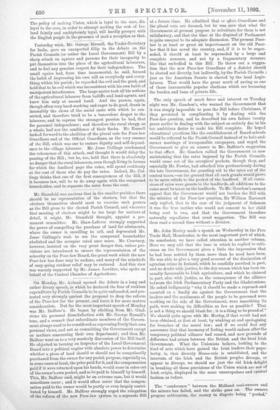On Monday, Mr. Acland opened the debate in a long
and rather dreary speech, in which he declared the fear of reckless expenditure by Parish Councils to be quite unfounded, and pro- tested very strongly against the proposal to drop the reform of the Poor-law for the present, and leave it for more mature consideration. But far the most important speech of Monday was Mr. Balfour's. He began by eliciting from Mr. Glad- stone his personal dissatisfaction with Mr. George Russell's tone, and a remark that subordinate members of the Govern- ment always used to be considered as expressing freely their own personal views, and not as committing the Government except on matters concerning their own department; and then Mr. Balfour went on to a very masterly discussion of the Bill itself. He objected to turning an inspector of the Local Government Board into a political engine with absolute power to determine whether a piece of land should or should not be compulsorily purchased from the owner for any parish purpose, especially as, in some cases at least, the price paid for it and the compensation paid if it were returned upon his hands, would come in rates out of the owner's own pocket, and so be paid to himself by himself. This, Mr. Balfour said, might be an extreme case, but it would sometimes occur ; and it would often occur that the compen- sation paid to the owner would be partly or even largely contri- buted by himself. Mr. Balfour strongly urged the relegation of the reform of the new Poor-law system to a separate Bill at a future time. He admitted that es officio Guardians and the plural vote are doomed, but he was sure that what the Government at present propose to substitute for them is not satisfactory, and that the time at the disposal of Parliament is quite unequal to its adequate discussion. The present Poor- law is at least so great an improvement on the old Poor. law that it has saved the country, and, if it is to be super- seded, it should at least be superseded by a large and complete measure, and not by a fragmentary measure like that embodied in this Bill. He threw out a sugges- tion that the new Poor-law Guardians of a district should be elected not directly, but indirectly, by the Parish Councils ; just as the American Senate is elected by the local Legis- latures. That would have the great merit of saving us one of those innumerable popular elections whieh are becoming the burden and bane of private life.






































 Previous page
Previous page